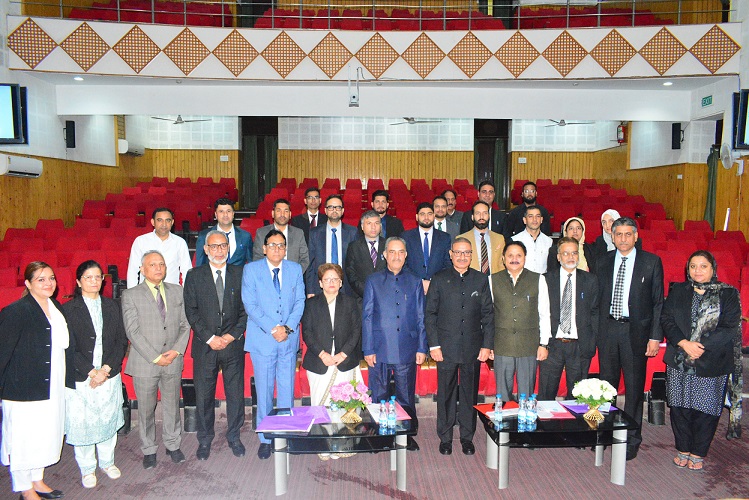Jammu and Kashmir Judicial Academy (JKJA) today organised two day workshop on “Arbitration & Conciliation Act and Commercial courts Act” under the patronage of Acting Chief Justice, High Court of Jammu & Kashmir and Ladakh (Patron in Chief , J&K Judicial Academy), Tashi Rabstan and guidance of chairperson and members of Governing Committee for J&K Judicial Academy.
The workshop, organized on Arbitration & Conciliation Act,1996 Law practice & procedure; and commercial courts Act, laid special emphasis on dealing with commercial disputes qua intellectual Property Rights for Judges of District Judiciary of Kashmir province at J&K Judicial Academy, Moominabad, Srinagar.
The event was inaugurated by Justice Javed Iqbal Wani, Judge High Court of J&K and Ladakh, Member, Governing Committee for J&K judicial Academy in presence of Justice Ali Mohammad Magrey, former Chief Justice of High Court of J&K and Ladakh.
In his inaugural address, Justice Javed Iqbal Wani deliberated upon the need for organizing such workshops on regular intervals. He said that it is very significant in the act of Arbitration & Conciliation Act of 1996 that it does not allow courts to refer the parties to the Arbitration & Conciliation without the parties consent. Another key aspect of the Act is that the same provides for making of an award within a stipulated period of time unless it is an international Arbitration/Commercial Arbitration, he added.
Justice Javed Iqbal Wani highlighted the Commercial Courts Act 2015 connected with the Arbitration & Conciliation occupying the legal Jurisprudence.
The Commercial Courts and the acts define all the disputes arising out of Commercial activities summary procedure for conduct of the case and delivery of the judgements.
So far, as the disputes pertaining to the intellectual Property Rights are concerned the same are also handled by the Commercial courts and the said courts had dealt with the Commercial disputes that may arise from transaction between the parties, traders, bankers financers and merchants and such disputes would also include the matters relating to the intellectual Property Rights such as registered and unregistered trademark copyright, patent, designed domain names etc.
Director Judicial Academy, Sonia Gupta, welcomed all the dignitaries, resource persons including the judicial officers and delivered the introductory remarks. She said the workshop presents a critical opportunity for all of us to engage with the latest developments in Arbitration, Commercial disputes resolution and intellectual Property law.
First session on the day 1 was led by Justice Ali Mohammad Magrey, Former Chief Justice of Jammu and Kashmir & Ladakh. He discussed on the interplay between the Arbitration & Conciliation Act 1996 and Commercial courts Act 2015.
The Arbitration & Conciliation Act was enacted to facilitate the resolution of disputes, outside the traditional court system..
This alternative mechanism allows parties, particularly in commercial contexts to avoid the delays and costs associated with litigation.
At the same time, the Commercial Courts Act 2015 plays an equally significant role recognizing the growing complexities in commercial transactions and the rise in disputes.
This Act sought to streamline the adjudication of Commercial cases by establishing dedicated courts with specialized knowledge in this area.
The two acts together form the backbone of modern commercial dispute resolution in India making it essential for Judicial Officers and legal practitioners to remain up to date with the nuances, challenges & opportunities they present.
Justice Magrey also highlighted the landmark judgements regarding the Arbitration & Conciliation Act 1996.
The second session on day 1 was led by Justice Mohammad Yaqoob Mir, former Chief Justice of Meghalaya who discussed the scope of injuction relief under Section 9 of the Arbitration act and discussed that this section gives courts the power to grant interim relief during Arbitration proceeding.
This relief can be used to prevent irreparable harm to the parties involved. The scope of this relief includes Persevering property, securing disputed amounts, Authorizing entry to property, granting injunction, appointing receivers, compelled disclosure and attachment orders, he added.
The participants evinced keen interest during all the sessions and raised several queries.

